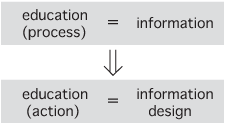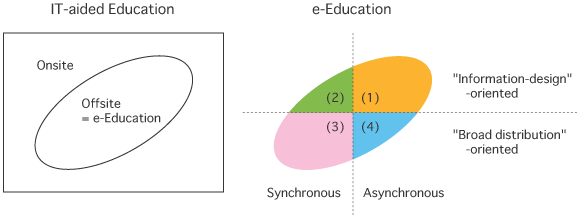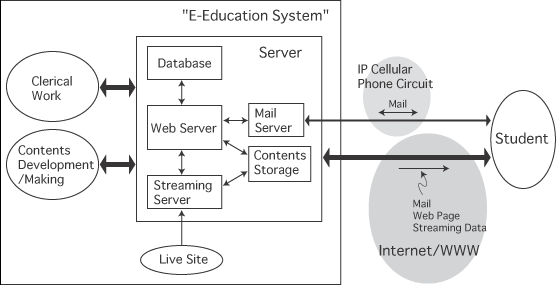 PDF
PDF
| On E-Educator Training for "Information Design"-Oriented E-Education |
Created : 2003-12-11 Modified: 2003-12-11 |
| SSGRR 2003s : International Conference on Advances in Infrastructure for Electronic Business, Education, Science, Medicine, and Mobile Technologies on the Internet, L'Aquila/Italy, 2003/7/28 - 8/3 |
 PDF
PDF
|
"Advance in e-education infrastructure" makes sense when advance in the e-education superstructure, which is the e-educator, meets it.
"E-education" I subject here is the one which comes from the standpoint of "information design". It becomes : (1) webbased and asynchronous, (2) intended for nurturing/raising/training faculty, rather than providing knowledge, (3) intended for complement of onsite education, rather than substitute for attending school, and (4) introduced as solution for problem-solving- type education, or self-teaching system. The e-education of this sense scarcely goes with division of labor. The e-educator is to enter, more or less, all levels of eeducation - from academic specialty to IT-literacy. This type of ability integration is formed through "information design"-oriented practice. In particular, the faculty development on e-education is mostly characterized as faculty development on information design. |



| Realization | Management | Development | |||
| School/ Course |
Character- ization |
Concept Aim/goal |
x | x | x |
| Online System |
Web Server Database Network |
x | x | x | |
| Discipline | Organization Students' experience Web contents |
x | x | x | |
| Target | |||
| Server System | Contents | Students | |
| Planning /Organization | Design /Construction of System | Preparation of Contents | Specification of Targeted Students |
| Practice /Management | Use /Management /Administration of System | Management /Administration of Contents | Instruction /Management |
| Evaluation | Evaluation of System | Evaluation of Contents | Evaluation of Students' Results |
| Realization Management Development |
|||
| School /Course |
Character- ization |
Concept Aim/goal |
A |
| Online System |
Web Server | B | |
| Database | C | ||
| Network | D | ||
| Discipline | Organization | E | |
| Student's experience |
F | ||
| Web contents | G | ||
| School/ Course |
"Character- ization" |
"Concept" "Aim/goal" |
|
| "Online system" |
"Web Server" "Database" "Network" |
|
|
| "Discipline" | "Organization" |
|
|
| "Student's experience" |
|
||
| "Instruction /Web contents" |
|
| instruction-design /teaching-material-making |
= | information design |


| Type | Class Name | Credit |
| "Audit" | Elemenatary School Mathematics | 4 |
| Information Design | 2 | |
| Course Development | 2 | |
| "Practice" | Computer Operation | 2 |
| "Report Making" | Lower Secondary School Mathematics | 4 |
| Upper Secondary School Mathematics | 2 | |
| Mathematics Information Design | 2 | |
| "Project" | Integrated Research Activity | 4 |
| Seminar on Mathematics Education | 4 |
| Grade | 1 | Spring | Computer Operation | Integrated Research Activity |
| Fall | ||||
| 2 | Spring | Lower Secondary School Math | Elemenatary School Math | |
| Fall | ||||
| 3 | Spring | Math Information Design | ||
| Fall | Seminar on Math Education | |||
| 4 | Spring | |||
| Fall |

|
A scene of the seminar (Presentation
to visitors from other countries) |


| [1] | Miyashita,Hideaki (1995). Multimedia and mathematics education: Breakthrough by communication technology. (Japanese) Study in Curriculum Development, vol.4 ("Children and communication"), Tokyo-shoseki, pp.238-252. |
| [2] | Miyashita,Hideaki (1995). On the system of education-as-information-designing : (1) The situation for multimedia communication. (2) The school in the multimedia revolution. (Japanese) Bulletin of the Research and Guidance Center for Teaching Practice, Hokkaido University of Education, no.14, pp.29-37, 39-48. |
| [3] | __________ (1997). Practice of "WWW Online Class". Journal of Hokkaido University of Education (Section IC), vol.48, no.1, pp.271-286. |
| [4] | __________ (2000). Developing a WWW-based Instruction system. (Japanese) Bulletin of the Information Processing Center, Hokkaido University of Education, no.5, pp.33-40. |
| [5] | __________ (2000). A report on the practice of making use of WWW-based instrucion system. (Japanese) Bulletin of the Integrated Center for Educational Research and Training, Hokkaido University of Education, no.1, pp.159-167. |
| [6] | __________ (Since 1995). http://m.iwa. hokkyodai.ac.jp/ mathedu/ ("Illustrated Mathematics Education") |
| [7] | __________ (Since 1995). http://m.iwa. hokkyodai.ac.jp/ school/ (E-education site) |